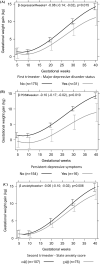Maternal mental health and gestational weight gain in a Brazilian Cohort
- PMID: 34031477
- PMCID: PMC8144604
- DOI: 10.1038/s41598-021-90179-6
Maternal mental health and gestational weight gain in a Brazilian Cohort
Abstract
Depression and anxiety are common during pregnancy, but little is known about the influence of these disorders on gestational weight gain (GWG). Data from a prospective cohort of pregnant women followed in a public healthcare center in Rio de Janeiro, Brazil, were used to evaluate the association of depression, anxiety, and suicide risk with GWG. GWG was evaluated at 5-13, 20-26, 30-36, and 37-42 weeks, and GWG adequacy was determined. Statistical analyses included linear mixed-effect models and Poisson regression. We evaluated 206 women, in which 15% (n = 31) presented major depressive disorder, 19.4% (n = 34) suicide risk and 10% (n = 21) generalized anxiety disorder at baseline. Women with depression at the first trimester, persistent depressive symptoms, and anxiety symptoms at the second trimester presented significantly lower rates of GWG per week compared to those without depression or anxiety, respectively. Persistent depressive symptoms represented a 2.40 (95% CI 1.20; 4.81; p = 0.013) increase in the risk of insufficient GWG. There was no significant association between generalized anxiety disorder or suicide risk with GWG. The presence of depression, depressive symptoms, and anxiety during pregnancy were associated with lower GWG rates. Persistent depressive symptoms during pregnancy were directly associated with insufficient GWG.
Conflict of interest statement
The authors declare no competing interests.
Figures


Similar articles
-
Inadequacy of gestational weight gain during high-risk pregnancies is not associated with household food insecurity.BMC Pregnancy Childbirth. 2021 Jun 29;21(1):460. doi: 10.1186/s12884-021-03950-y. BMC Pregnancy Childbirth. 2021. PMID: 34187424 Free PMC article.
-
Association between vitamin D status during pregnancy and total gestational weight gain and postpartum weight retention: a prospective cohort.Eur J Clin Nutr. 2020 Jan;74(1):126-134. doi: 10.1038/s41430-019-0465-2. Epub 2019 Jul 15. Eur J Clin Nutr. 2020. PMID: 31308475
-
Maternal Pre-Pregnancy BMI and Gestational Weight Gain Modified the Association between Prenatal Depressive Symptoms and Toddler's Emotional and Behavioral Problems: A Prospective Cohort Study.Nutrients. 2022 Dec 30;15(1):181. doi: 10.3390/nu15010181. Nutrients. 2022. PMID: 36615838 Free PMC article.
-
Gestational weight gain rates in the first and second trimesters are associated with small for gestational age among underweight women: a prospective birth cohort study.BMC Pregnancy Childbirth. 2022 Feb 5;22(1):106. doi: 10.1186/s12884-022-04433-4. BMC Pregnancy Childbirth. 2022. PMID: 35123424 Free PMC article.
-
Exploring the relationship between sunlight exposure, psychological health, and gestational weight gain: a prospective observational study.BMC Public Health. 2024 Jan 9;24(1):122. doi: 10.1186/s12889-024-17677-w. BMC Public Health. 2024. PMID: 38195450 Free PMC article.
Cited by
-
Socioeconomic and clinical factors associated with excessive gestational weight gain.Arch Gynecol Obstet. 2024 Apr;309(4):1295-1303. doi: 10.1007/s00404-023-07000-0. Epub 2023 Mar 17. Arch Gynecol Obstet. 2024. PMID: 36930325 Free PMC article.
-
Gestational Weight Gain During the COVID-19 Pandemic.Matern Child Health J. 2023 Sep;27(9):1454-1459. doi: 10.1007/s10995-023-03730-4. Epub 2023 Jun 8. Matern Child Health J. 2023. PMID: 37289294 Free PMC article. Clinical Trial.
-
Mental Health during the Interpregnancy Period and the Association with Pre-Pregnancy Body Mass Index and Body Composition: Data from the INTER-ACT Randomized Controlled Trial.Nutrients. 2023 Jul 14;15(14):3152. doi: 10.3390/nu15143152. Nutrients. 2023. PMID: 37513569 Free PMC article. Clinical Trial.
-
Educational Reward and Punishment and the Effect of Psychological Intervention on Adolescent Depression.J Environ Public Health. 2022 Sep 6;2022:3919519. doi: 10.1155/2022/3919519. eCollection 2022. J Environ Public Health. 2022. Retraction in: J Environ Public Health. 2023 Jun 28;2023:9830105. doi: 10.1155/2023/9830105. PMID: 36111067 Free PMC article. Retracted.
-
Determinants of gestational weight gain during pregnancy in a multiethnic UK-based population: Findings from the Born in Bradford cohort study.PLoS One. 2025 May 23;20(5):e0323278. doi: 10.1371/journal.pone.0323278. eCollection 2025. PLoS One. 2025. PMID: 40408360 Free PMC article.
References
-
- Eichler J, Schmidt R, Hiemisch A, Kiess W, Hilbert A. Gestational weight gain, physical activity, sleep problems, substance use, and food intake as proximal risk factors of stress and depressive symptoms during pregnancy. BMC Pregnancy Childbirth. 2019;19:175. doi: 10.1186/s12884-019-2328-1. - DOI - PMC - PubMed
Publication types
MeSH terms
LinkOut - more resources
Full Text Sources
Other Literature Sources
Medical

